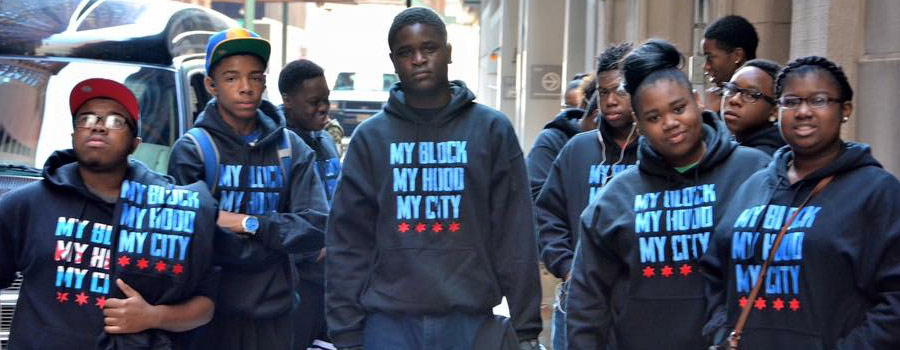
My Block, My Hood, My City takes teenagers from underserved Chicago communities on explorations across the city and beyond, exposing them to different cultures, careers, and people to show teens all that is available and accessible to them.
"Oh my god I am in a whole 'nother place!" exclaims Kenneth Bowman as he puts on virtual reality goggles and paints his surroundings in brilliant pink stripes. "I'm next, I'm next!" cry Bowman's classmates, who like him are dressed in black hoodies emblazoned with the words "My Block, My Hood, My City."
They are students from Paul Robeson High School in Englewood. The 15 students are visiting SteelSeries, a video gaming company in the West Loop, a neighborhood many of them had never been to before.
"Welcome to our block," says SteelSeries Chief Technology Officer Tino Soelberg, explaining that the West Loop is home to multiple hot technology companies, including Google, Glassdoor, Uber, and Signal. A native of a Denmark, Soelberg shows pictures of his hometown, a Copenhagen suburb.
SteelSeries finance director Karen Tolbert hails from Chicago's South Side, like the Robeson students. Growing up, she tells them, she was a "nerd" who loved math. She turned that interest into a dream job.
Encouraging students to aspire to such dream jobs—and to imagine jobs they never knew existed—is one of the aims of My Block, My Hood, My City (M3), a program founded and run by Jahmal Cole, 34.
The program takes teenagers from underserved Chicago communities on explorations across the city and beyond, from museums to restaurants to businesses to meetings with well-known individuals. By exposing youth to different cultures, careers, and people outside their neighborhood, the program shows teens all that is available and accessible to them—that their worlds do not have to be limited by economics or other challenges they may have faced in their young lives.
Such exposure to the wider world also helps youth better understand and take pride in their own neighborhoods, as Cole sees it, boosting their self-confidence and inspiring them to become active, engaged, and self-determined citizens.
Isolation leads to narrow-mindedness no matter where you live.
This self-awareness and a glimpse of the opportunities available to them motivates students to finish high school and go on to college, Cole says.
He knows this from first-hand experience, since he was inspired to go to college, at the Wayne State College in Nebraska, in part by cross-country bus trips to visit relatives.
"Isolation leads to narrow-mindedness no matter where you live," Cole said. "Some kids at college in Nebraska had never met a black person before."
M3 has taken students to President Obama's historic farewell speech in Chicago; to Washington D.C., where they stood in the same spot that Rev. Martin Luther King Jr. made his "I Have a Dream" speech; New York, where they appeared on the Today Show and visited Central Park; and Springfield, Ill., where they met with the state treasurer. M3 as taken them to businesses like Facebook, Pandora, and the Silver Room; to a Chicago Bulls game—where they met privately with owner Jerry Reinsdorf; and to the bakery Bon Macaron, where they learned from a professional pastry chef trained in Paris.
Cole long ran the organization with a modest budget and the help of volunteers, while also working full-time himself as a Microsoft administrator at a trading firm. But in February 2016 he took a leap of faith and left that job so he could devote more time to M3. Over the past year, he also brought two volunteers on staff as chief operating officer and chief development officer. And this school year, two new part-time program positions will be added.
"I hired more staff because I don't want to lose those personal relationships with our explorers," as the program grows, Cole said. "When students really feel understood and valued, they'll text message you in the middle of the night, or they may call you if they have a question about life."
In September, Cole released a book, Exposure is Key: Solving Violence by Exposing Teens to Opportunities. He also was featured in a video series launched by the Obama Foundation to showcase the work of community leaders. In the video, Cole helps to rebrand the South Side, emphasizing its long history of community organizing, cultural achievement, and other assets.
This is a positive movement. It gives people hope to see what they could do.
Noah Hackworth from South Shore, now 20, went on explorations with M3 to Wicker Park, Greek Town, a White Sox game, and a downtown advertising agency. Thanks to those adventures, Hackworth now frequently travels around the city. "This is a positive movement. It gives people hope to see what they could do," Hackworth said. "It shows you how change starts with you and the people close to you."
Robeson student Rickie Jones said the SteelSeries trip showed him the potential for international collaboration in business, "that not all businesses come from Chicago."
Jones' teacher, Ryan Alexander, said M3 explorations are not about having students strive to leave their neighborhood.
"It's saying, 'Look what exists, look what is out there,'" Alexander said. "And it gives them freedom to say, 'I'm going to make this happen for my own community.'"
MacArthur has provided $50,000 for general operating support to My Block, My Hood, My City.



